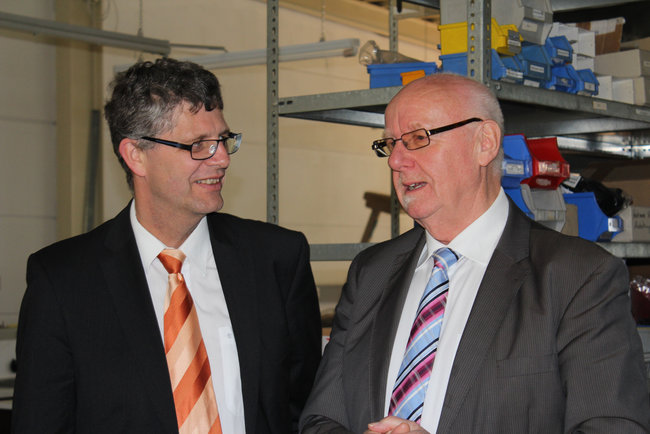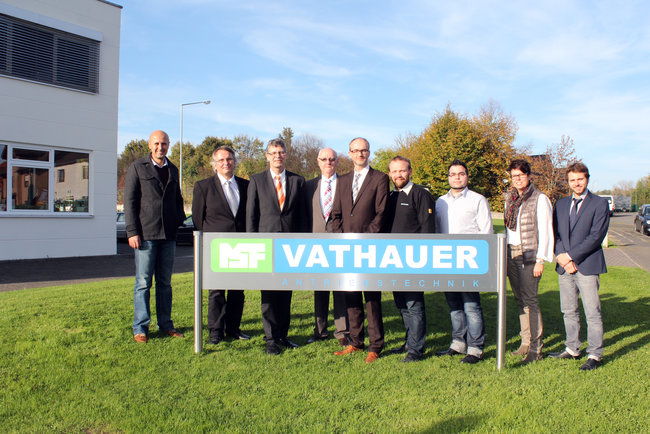According to Managing Director Karl-Ernst Vathauer "it's precisely the introduction of ICT that enables production companies to continually monitor and to control their energy demand and consumption. At the beginning, this transparency creates new possibilities for the resources deployment to combine and optimise automation and energy management know-how. Production will drastically become more energy-efficient while protecting the resources." To this end, new intelligent and innovative solutions must be developed, in order to implement the industry vision 4.0.
The crucial point in the implementation of industry 4.0 is the transition from centralized control systems in production facilities, which are the most common today, to a decentralised control concept, in which the workpiece itself carries all the necessary information for its processing. With its innovative solutions for the decentralised drive traction technology, MSF Vathauer has been developing technologies for years for the factory of the future, which operates in a modular, flexible, self-organized and autonomous way.
This decentralised control is possible through embedded systems, also microelectronic systems, which carry their own calculating capacity as well as sensors and actuators, and which are themselves embedded in even larger systems or objects. If you fit such embedded systems additionally with wireless communication and give them the capacity to interweave themselves into the value-added chain, then we would be talking about cyber-physical systems. The building blocks and neurons of industry 4.0.
Operating comfort, product security, ergonomics and availability are some of the criteria that speak for the introduction of wireless energy transmission systems. The increasing miniaturisation of sensor and actuator technology as well as mechatronics components, which require flexible and high energy supply, is an enormous driving force for this technology.
This aspect is of utmost importance especially for the energy transfer. The discontinuation of trailing cables or power rails does not only increase the safety of the systems, which receive orders, but also dynamism and additional degrees of freedom.
In order to accomplish work operations in a faster way, efficiently and flexibly, cyber- physical systems (CPS) must also communicate among themselves in an actively thinking production and also take over sensor and actuator functions, for which they also need energy. The wireless transfer has an advantage: it is not susceptible to wear as is the case with trailing chains and does not know any interfering cables, which would impair the mobility of CPS.
Christian Haase was delighted about the company's research in the area of energy efficiency and of the already available intelligent automation solution "MONO-SWITCH Field Drive System® Even Thinking", which was awarded prizes several times last year.
Christian Haase: "I am very happy and proud that the fantastic research work of the company MSF Vathauer was honoured also with prizes beyond our region. The efforts of the company about energy efficient and resource-protecting technologies are exemplary!"
During the conversation, Karl-Ernst Vathauer presented all the possibilities future to integrate the application into the company's existing products. In particular he highlighted the innovative energy management solutions that need to be created, in order to accomplish industry 4.0 as well as to make it more energy-efficient and resource-protective.
During a walking tour, Karl-Ernst Vathauer showed Christian Haase how energy efficiency and resource protection are implemented into his company.
Press Box) (Detmold, 29.10.2014) The subject of energy efficiency plays an important role also in the area of industry 4.0. The most important cyber-physical systems (CPS) must be supplied with sufficient energy all the time for sensors, actuators and data transfer functions, in order to connect production technologies with internet technologies in a technical using communication technology. During his visit at MSF Vathauer in Detmold, the member of the Bundestag Christian Haase, whose own focus lies mainly in the area of energy and environmental politics, came to learn about the topic of energy in the industry 4.0 and about innovative technologies and developments which are currently being developed by MSF Vathauer.

